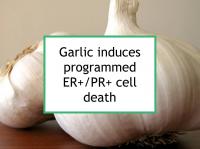Garlic has been linked to reduced risk of breast cancer, primarily due to its organosulfur compound content. Garlic compounds can inhibit DNA synthesis in breast cancer cells, retard their growth, and suppress angiogenesis. Now a new study has shown how diallyl disulfide induces apoptosis in (ER+/PR+) breast cancer cells.
Organosulfur compounds found in garlic include diallyl sulfide, diallyl disulfide, diallyl trisulfide, diallyltetrasulfide, and dipropyltetrasulfide, among others. Several organosulfur compounds have been shown to inhibit breast cancer cell growth and proliferation by interfering with the cell cycle. The garlic compound diallyl trisulfide has been shown to suppress breast cancer cell invasion and metastasis, thereby delaying the onset or progression of breast cancer.
Organosulfur compounds are produced upon cutting or chewing garlic. Although some of the anticancer benefits of garlic are retained after cooking or processing it, raw garlic appears to have the most benefits.
Latest research investigates actions of diallyl disulfide
The study referenced at the beginning of this news article was designed to investigate the actions of diallyl disulfide, the major organosulfur compound found in garlic oil, in breast cancer. The authors performed a series of studies using hormone receptor positive (ER+/PR+) MCF-7 breast cancer cells. Diallyl disulfide was shown to induce apoptosis in MCF-7 cells by interfering with cell-cycle growth phases. Diallyl disulfide also induced phosphatidylserine translocation (from the inner to the outer leaflet of the plasma membrane) and activated caspase-3, thereby impairing breast cancer cell proliferation.
In further studies, the authors demonstrated that diallyl disulfide altered the cellular levels of Bax, Bcl-2, Bcl-xL, and Bcl-w in a dose-dependent manner, suggesting the involvement of Bcl-2 family proteins in diallyl disulfide-induced apoptosis. In addition, the authors showed that diallyl disulfide has histone deacetylation inhibitors (HDACi) properties in MCF-7 cells. HDACi are known to inhibit cancer growth and induce apoptosis in cancer cells. The authors conclude that the HDACi properties of diallyl disulfide might be responsible for its induction of apoptosis in breast cancer cells.
Please see our articles on garlic and what ER+/PR+ breast cancer patients and survivors should eat for more information.
